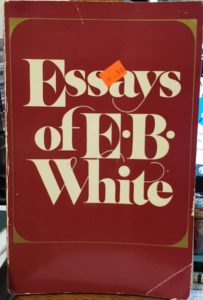
About a month ago I finished whatever book I was reading and searched my shelves for what to read next. Should be easy, right? I make it a little complicated, however, in that I want to read books that interest me but which I don’t want to keep permanently. I want to be able to get rid of them when done. The book I had just finished was a keeper, so for sure I wanted to go on to a non-keeper. As I say, should be easy, but with thousands of books in the house it isn’t. The volume makes it harder and, alas, I don’t have a prepared non-keeper pile.
But I searched and found this in the Essays of E.B. White. While he isn’t a household name, White wrote Charlotte’s Web. Of interest to writers and perhaps English majors, he collaborated on later editions of Strunk’s book The Elements of Style, a short book about improving English composition. Some time ago, measured in years, I picked up White’s Essays from a used book or thrift store. It has sat on my literature shelf in the basement, waiting for me to notice it again. The perfect book to read now, I thought. ‘T’will be interesting to me but not one I want to keep.
And so it is. I actually know fairly little about White but learned much through his essays. First, he’s a New Englander, like me, having spent much of his life in Maine (though with sojourns in New York City and Florida). He was a newspaper columnist. Some of his essays were culled from his columns. I didn’t get a feel for who he wrote for (a particular paper or syndication), nor what type of column it must have been. In his writing I found: satire, though I wouldn’t call him a satirist; humor, though he’s not a humorist; irony, though he’s pretty down to earth; concern for the planet, though he doesn’t seem to have been an environmental writer; politics, though he was not really a political writer or pundit.
So what kind of writer was he in these essays? Interesting. Sorry, Mrs. Abrams, my 12th grade English teacher. I know that’s an unacceptable response, but I have to say it. The essays were a mix of all of those things in the last paragraph, and the variety held my interest. He wrote about the life in rural Maine and of farm chores and events. It gave authenticity to Charlotte’s Web. He wrote about apartments in New York City. He wrote about harm being done to the planet by different human activities. He wrote about Democrats and Republicans not getting along and, except for the names of the individuals involved, those essays could have been written today.
Reading these essays tickled me into a case of Sidelines Syndrome, and I felt the urge to write essays. I came to my senses pretty quickly, however, as I have too many writing projects going on right now. I suppose if a writer spurs another writer to emulate him, that writers has done well.
Now, two questions remain: Should you run out and try to find a copy of this and read it (published 1977, my paperback published 1979)? And, is it a keeper after all? The answer is no to both. First, it will be hard to find. Second, it will be somewhat boring, I think, to anyone who doesn’t currently read essays. Third, as far as keeping it, for me it’s a I’m-glad-I-read-it book, no regrets at investing some time in it, but I don’t see myself ever reading it again.
So, into the sale pile it will go. The binding is partly broken, the cover has a fold in it. I don’t see it ever selling, either in my yard sales or in a thrift store, but I can’t bear the thought of throwing it out. So to the garage sale shelf it goes.